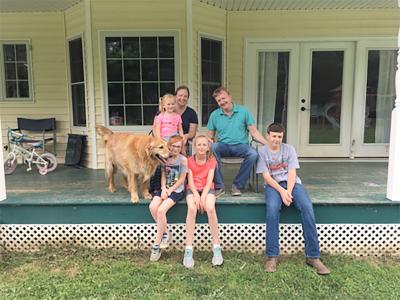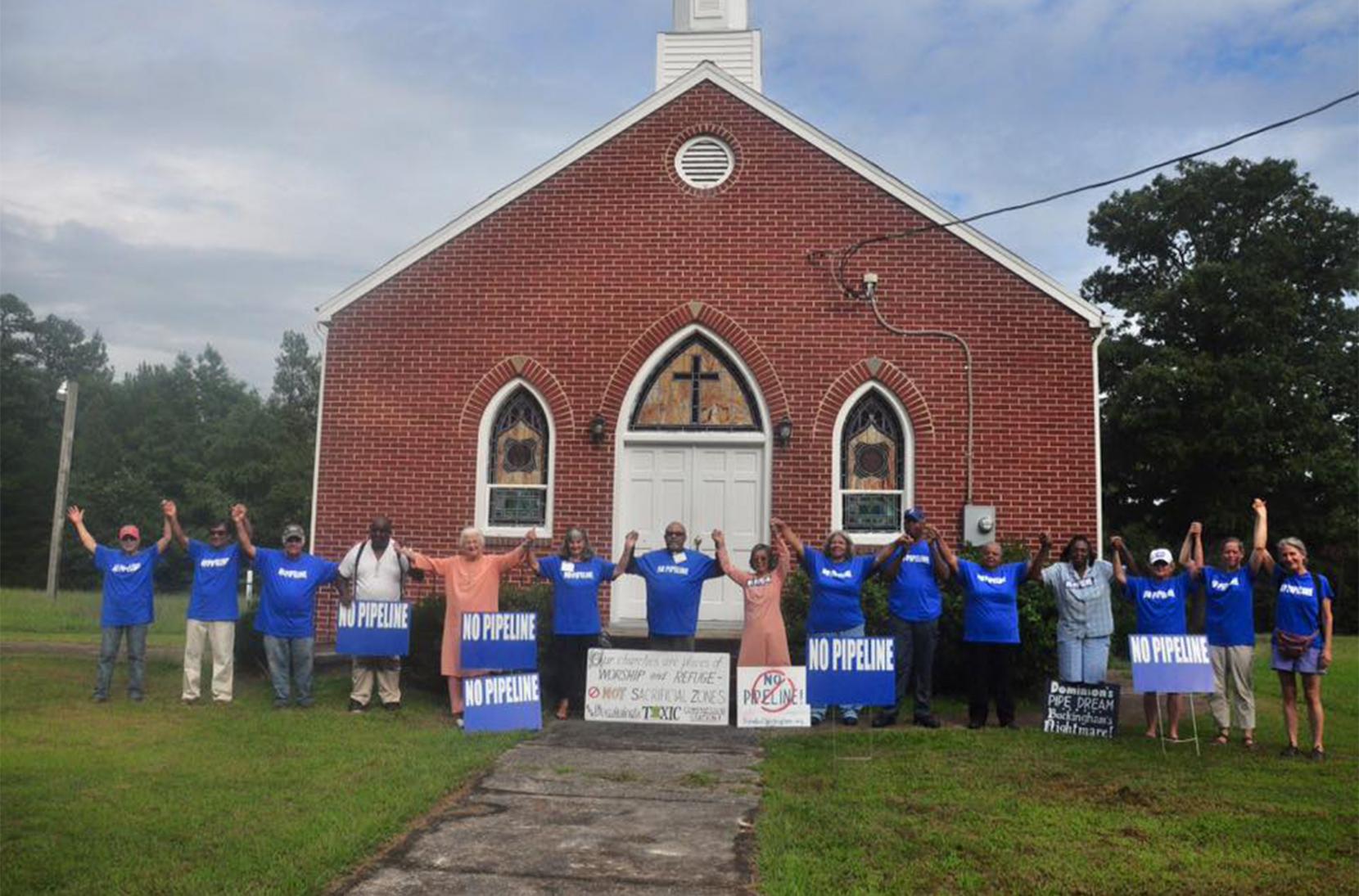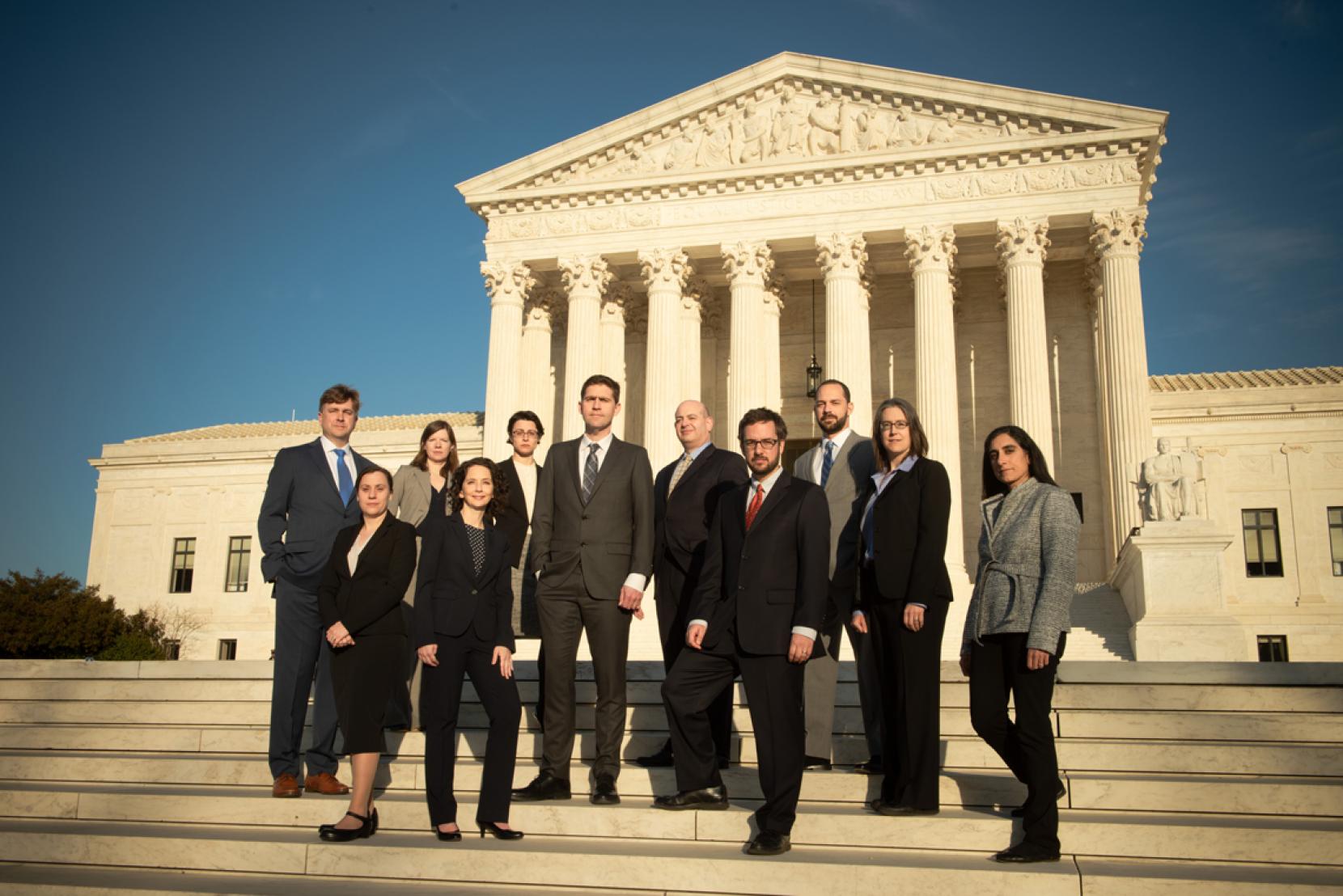SELC’s pipeline team reflects on the path to victory
“We’re a billion-dollar company and we’re going to put the pipeline wherever we want to put it.”

That’s what a Dominion Energy agent told a father in Churchville, Virginia, whose family home was in the path of the proposed Atlantic Coast Pipeline. But when Dominion and its partner, Duke Energy, abruptly cancelled the project last Sunday afternoon, that claim – and all those made before it – about how the $8 billion gas pipeline was necessary to support future energy demand in Virginia and North Carolina were proved wrong.
The Atlantic Coast Pipeline is now one of the only examples of a major natural gas pipeline abandoned due to legal defeats and overwhelming community opposition.
More than once, the saga has been compared to a David and Goliath tale about how landowners and other activists banded together to defeat the wealthy, well-connected utilities and their destructive pipeline.
On the legal front, the rushed, rubber-stamp approval process typical for projects like this opened the pipeline up to several legal defeats thanks to SELC and partners, spotlighting a flawed approval system in need of reform.
But that was only one piece of the puzzle. Getting to victory required a complex network of policy, outreach, and strategic approaches, working alongside a huge coalition of advocates and 15 client organizations. At SELC, the six-year battle pulled from the skills and expertise of dozens of staff.
Here are some of their stories and reflections on this momentous victory.
What will stick with Greg Buppert, the senior attorney who lead the pipeline team, is the determination of the people SELC represented: Ella Rose, Rick Webb, Kate Wofford, Lew Freeman, John and Ruby Laury, Nancy Sorrells, Lynn Cameron, Dick Brooks, Dave Sligh, “and so many other good, kind people who put everything aside to fight for a better future for Virginia and North Carolina.”
Adds Buppert, who has worked on every ACP case since it was proposed, from defending the people of Union Hill in their environmental justice case to countless briefings and filings regarding environmental violations, “They never backed down, even when winning felt like a fantasy. You can’t forget that kind of commitment.”

Multiple attorneys and staff agree that when they received the somewhat stunning news that the Atlantic Coast Pipeline had been cancelled, it was those partners they’d worked so closely with over the past six years who were top of mind.
“They were the first people I thought of on Sunday,” says Claudine Ebeid McElwain, the senior communications manager who led SELC’s multi-faceted communications strategy to take down the pipeline. She’s referring to John and Ruby Laury, two residents of Union Hill in Buckingham County who proved to be fierce pipeline opponents, becoming the face of dismantling the project’s polluting compressor station proposed in their community.
“Their story of retiring to John’s childhood home to farm and finding themselves becoming environmentalists late in their lives is really powerful,” she adds. For background on the Laurys story, listen to Claudine Ebeid McElwain’s compelling interview with them on SELC’s podcast Broken Ground.
“Union Hill had to go to court to prove to pipeline developers that their community existed and to make sure their health would be considered before a compressor station would be approved in their community,” says Sarah Francisco, director of SELC’s Virginia office. “It was our honor to represent Friends of Buckingham in that case. And in winning that ruling and righting that wrong, together we set a strong precedent for environmental justice that reverberates through Virginia and beyond.”
Court delivers win for Union Hill residents over Atlantic Coast Pipeline
Francisco had just sat down to share some late Fourth of July burgers with family when she got the news of the pipeline’s abrupt cancellation.
“I was stunned,” she says. “We knew there were pivotal moments coming up over the next few months, but I was stunned to suddenly hit the end of this saga. I was filled with gratitude for all the SELC attorneys and staff who worked full steam ahead for so long, bringing excellence, energy, creativity, and commitment every day, and for all our client groups and their members who kept writing comments, and standing up at public meetings, and refusing to give up, even when pipeline developers said our voices didn’t matter and decision-makers churned out permits.”
SELC Program Director DJ Gerken, who led the challenge to the Forest Service permit that went all the way to the Supreme Court out of SELC’s Asheville Office, says the victory is a symbol that the gold rush on unnecessary pipelines is over.
“And no one is going to mess with public lands or underserved communities in our six states again without stopping, thinking, and worrying about SELC,” he adds.
But the case wasn’t always a shoe-in. In fact, it was far from it: Gerken will tell you that when the organization first took on the case six years ago, “it looked uphill.”
New report shows demand doesn’t justify new natural gas pipelines
Attorneys didn’t fully understand the magnitude of the effort they were embarking on, says Buppert.
“Right from the beginning the project had serious problems, and we had clarity about those,” he adds. “But I am not sure how I would have responded if I knew that it would take six years to stop this project.”
Katie Storer, an administrative and legal assistant who also poured countless hours into trying to stop the pipeline, says, “I knew SELC would at least try to speak out against it because it was the right thing to do. But win? No. I didn’t think that was possible.”
Strategically, there was a lot to work with.
Right from the beginning the project had serious problems, and we had clarity about those. But I am not sure how I would have responded if I knew that it would take six years to stop this project.
Greg Buppert, Senior Attorney
Francisco, who had just successfully led a campaign to protect the George Washington National Forest from gas drilling and fracking, says attorneys saw right away that the permit to cross the national forest would be key.
“The pipeline was redundant, it needed tons of permits that were interdependent on each other, and cases went straight to the Court of Appeals, which meant we could have a lean and fast litigation strategy,” Gerken reflects.
One strategy used by pipeline developers is to get the pipe in the ground before courts have a chance to rule on legal challenges. Echoing Gerken, Senior Attorney Patrick Hunter says, “We had to move fast and creatively to stop as much construction as we could while our cases were pending.”
Explaining what was going on with the case and the utilities behind the curtain was a challenge for Ebeid McElwain, who eventually convinced thousands of people about its lack of need. “It was complicated, but important and something the public definitely needed to know about,” she says.
That work to pull back the curtain and tell a fuller story of the pipeline project was key. As Danielle Fontaine, a legal assistant on the project for more than three years, notes, “One of our biggest challenges was changing the narrative. Dominion and Duke are institutions in the Southeast with histories that stretches back more than 100 years. This political clout combined with their vast financial resources made for a long and difficult road.”

At SELC, the story of defeating the Atlantic Coast Pipeline is one full of unexpected twists and turns. Hunter says one of those twists involved packing up and heading to the highest court in the nation in February.
“When we started working on this project, I don’t think we anticipated a trip to the United States Supreme Court,” says Hunter. “We didn’t get the outcome we wanted, but it was an experience of a lifetime.”
Hundreds of people stood in line all night to try to get into the Supreme Court argument, which had an extremely limited capacity.
From the steps of the Supreme Court
“I got to talk with many of them in the wee hours of the morning and those conversations stick with me,” Hunter says. “The passion people had for their communities, the landscapes where they made their homes, and the animals that shared those landscapes was inspiring. People were even eager to talk about the Madison Cave Isopod — a protected freshwater crustacean in the path of the pipeline.”
Gerken shares another story of an endangered species in the path that left a lasting impact on him: Dominion insisted on plowing through a clubshell mussel habitat instead of rerouting, and its plan was to move the mussels to another habitat.
“But since they didn’t know of any other suitable habitat, they took them to a hatchery, where they accidentally killed the entire population,” says Gerken. “That catastrophic blunder for me sums up the dereliction of every federal agency with respect to this project.”
Nat Mund, director of the Washington, D.C. Office and director of federal affairs, says one of the biggest challenges early on was that the politics were all wrong.
Explore the stories of people in the path of the pipeline
“Every elected person of both parties everywhere was in favor of moving this thing through, in particular in Virginia,” says Mund. “Plus, the permitting began in earnest right during the transition from the Obama administration to the Trump administration, and permits for an individual project, no matter how large, were never going to be at the top of anyone’s priority list—except ours.”
Mund says he felt like Wil-E-Coyote catching the Roadrunner when he learned the news that Dominion and Duke were cancelling the project.
“The surreality of it happening on the Sunday of a long weekend in the midst of a pandemic played out against the background of the greatest period of social upheaval in more than 40 years was definitely not how I envisioned things.”
Adds Mund, “I am still trying to wrap my head around it.” And for Buppert, “Even today, I am not sure that it has fully sunk in. We had worked to oppose the ACP for so long that once the news broke on Sunday, I was shocked. It was dramatic and amazing, but also so surreal.”

Now that the reality of this six-year effort is sinking in, the big question is: What does this win mean?
“That we can stand up to anyone,” says Mund. “That when we work together using all of the tools at our disposal: careful selection of issues; litigation in every possible venue, including regulatory bodies; lobbying at the local, state, and federal level; carefully calibrated communications that maintain long term engagement with media; and deep relationships with communities affected by issues, SELC and our partners can take on the toughest challenges and win.”
Ebeid McElwain says she predicts this is the start of new chapter in how we plan energy projects in America: “There’s been a lot leading up to this moment but there’s always a tipping point and I think this might be it.”
For Storer, “Personally, it really showed me that if you want to achieve something that seems impossible, just take the first step. Then the next.”
We can stand up to anyone. SELC and our partners can take on the toughest challenges and win.
Nat Mund, Director of Federal Affairs
Says Francisco, “Instead of having the pipeline dragging us backward, we can move forward.”
And for Hunter, it means people’s homes and communities won’t be devastated through construction of a pipeline they don’t want and whose primary purpose was to make money for corporate shareholders.
“It means kids born today in North Carolina and Virginia won’t be burdened in twenty years by having to pay for a pipeline they don’t need,” Hunter adds. “It means people can look forward to the cleaner energy future they deserve — not one dirtied by continued overreliance on massive fossil fuel infrastructure.”
